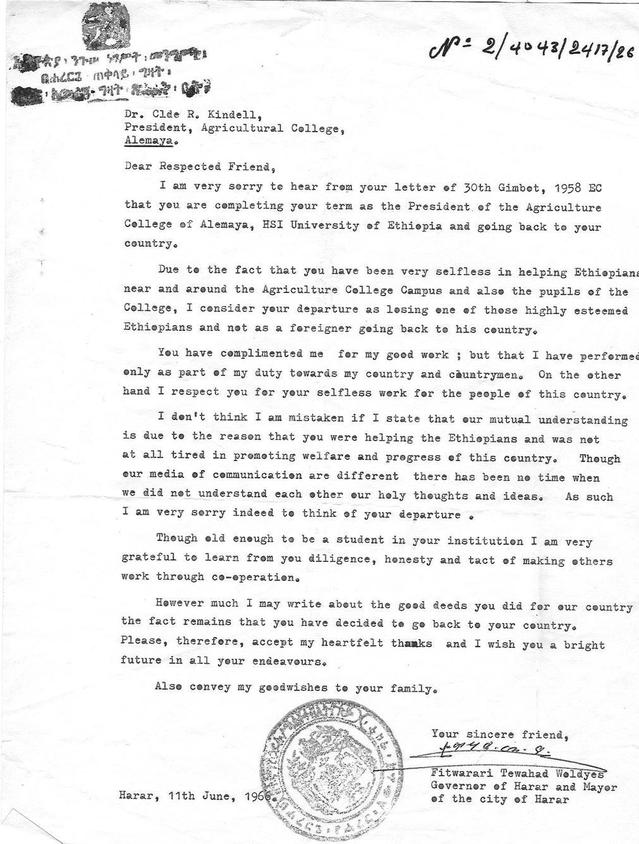Tadias Magazine
By Tadias Staff
Updated: Thursday, May 9th, 2013
New York (TADIAS) – In the summer of 1966 when Dr. Clyde R. Kindell, the last American President of Alemaya College of Agriculture and Mechanical Arts in Ethiopia, was preparing to return home to the United States, he received a letter from the Governor of Harar whom he had befriended during his eight-year stay in the country, which he kept as a memento.
The document, shared with Tadias, was written on June 11th, 1966 and signed by Fitwarai Tewahade Woldeyes. “Dear respected friend, I am very sorry to hear from your letter of 30th Ginbot 1958 EC [Ethiopian Calendar] that you are completing your term as the president of the Agriculture College of Alemaya and going back to your country,” it said. “I consider your departure as losing one of those highly esteemed Ethiopians not as a foreigner going back to his country.”
The governor goes on to inform Dr. Kindell that had he been younger he too would have chosen to enroll at Alemaya College. Nonetheless, “I am very grateful to learn from your diligence, honesty, and tact of making others work through cooperation,” he wrote. “Please, therefore, accept my heartfelt thanks and I wish you a bright future in all your endeavors.”
Upon his return to the United States, Dr. Kindell became president of Murray State College in Oklahoma, where he worked for 27 years until he retired in 1994.
In a recent phone conversation with Tadias Magazine from his current home in Denison, Texas, Dr. Kindell, now 86-years-old, shared his recollections of Ethiopia.
“To this day I am still in touch with the children of Fitwarai Tewahade, including Mel,” he said, referring to filmmaker and businessman Mel Tewahade, producer of the documentary Point Four, which explores the history of America’s “Point Four” foreign policy and its impact in Africa and Asia.
“I have fond memories of Ethiopia and the Ethiopian people,” said Dr. Kindell, who traveled to Ethiopia under Oklahoma State University’s Point Four agricultural program in the late 1950s. “My daughter was born in Jimma.”
Mel Tewahade told Tadias the letter was penned by his late father as a farewell and thank you to Dr. Kindell. “Since my father was the Mayor of the city of Harer and governor of surrounding region, he had frequent interaction with the American staff at Alemaya and that’s how the two developed their friendship,” he said.
Mel said that part of his father’s job was “to ensure that Americans were safe and any misunderstanding between them and the residents living around Alemaya was quickly and peacefully resolved, as well as security matters, such as attempting to reduce the use of Khat (Chat) in and around the school and developing a market for Alemaya grown potato.”
Dr. Kindell, who was 31-years-old when he first arrived in Ethiopia, served for two years as the Director of Instruction and Research at the Jimma Agriculture Technical School before taking the helm at Alemaya in Harar. He noted that he reported directly to Emperor Haile Selassie, who was the Chancellor of the nation’s university system.
“The Emperor was like a father figure to me,” Dr. Kindell said. “He would scold me from time to time, mostly for not learning Amharic fast enough.”
Dr. Kindell shared his “vivid memory” of an encounter he had with Emperor Haile Selassie in November 1963 as the Emperor prepared to leave for Washington, D.C. to attend President Kennedy’s funeral. “The Emperor had great respect and admiration for John F. Kennedy because they had met and Kennedy had sought his advice,” he said. “He was very saddened by his death.”
Speaking of Kennedy, Mel added that he has released another movie called Peace Corps in Ethiopia highlighting one of Kennedy’s legacies. “It was screened at Kotebe Teacher Training College in September 2012,” he said. “It was shown at the 50th year reunion of returned Peace Corps volunteers who served in Ethiopia and Eritrea.”
“The film is the history of Peace Corps involvement in Ethiopia from 1962 to 1976” Mel said. “We interviewed several volunteers and asked them to share their experience. Senator Harris Wafford of Pennsylvania and former director of Peace Corps in Ethiopia, outlines the contribution that Emperor Haile Sellasie made to the success of the program, and the support that Peace Corps got from President Kennedy and the director of Peace Corps Sargent Shriver.”
As to his own reminiscence of growning up near the school, Mel pointed out that the view from his father’s car window still remain fresh in his mind. “My most favorite of this time was the drive I used to make with my dad to Alemaya,” he said. “The lake was beautiful and there were plenty of fruit stands around the town of Alemaya. It was breathtaking.”
And back on the phone Dr. Kindell recalled, “So one day my wife and I had the Emperor over for dinner and all his family and other dignitaries were present,” he said. “I finally manged the courage to say, ‘Your Majesty, Ene bizu amarigna memar alchalkum.'”
Dr Kindell continued: “He sort of chuckled, and never bothered me about my language skills again.”
Below is a digital copy of the letter courtesy of Mel Tewahade:

Photos: Dr kindell hosting Emperor Haile Selassie and Jomo Kenyatta at Alemaya College
—
To learn more about Mel Tewahade’s film “Point Four,” please visit the website www.pointfourethiopia.com.
—
Related:
Filmmaker Interview About the Movie ‘Point Four
Haile Selassie in America: Q & A with Professor Ted Vestal
—
Join the conversation on Twitter and Facebook.

